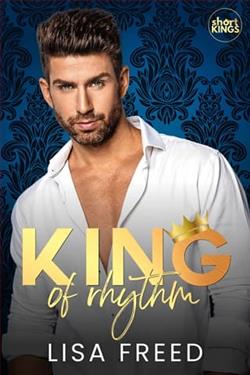Page 1 of Cage of Starlight
Part One:
Flight
CHAPTER ONE
Tory arknett isno stranger to the dead and dying, so when the bell on Thatcher’s repair shop tinkles to admit a group of blood-soaked miners, he greets them with no more than the usual amount of dread.
Captured in the streaked glass of the display case Tory’s dusting, the miners make a ghastly picture as they huddle on the wide circle of Thatcher’s beloved (and exceptionally ugly) floral rug—placed just inside the shop’s door for situations like today’s. One man even stuffs his dripping hands into his pockets to spare the rug. Thoughtful, but unnecessary: someday soon, when Thatcher’s not looking, Tory’s going to bury the appalling thing in the woods.
“Tory, a moment?” The tall man at the head of the group wrings his hands. “This one’s urgent.”
Like he couldn’t tell. “What is it this time?”
“Kelly got it bad in a cave-in. You got his wages for a week if you can save him.”
There’s always something like that. A week’s wages. An armful or three of obscenely large gourds. Some token payment so they can pretend they’re not gently coercing Tory to do this and he can pretend they don’t ever-so-politely have him by the throat.
Tory sets his dust rag down. “Where is he?”
“With Fedri.” His wife. “You gotta help him—they ain’t assigned a Healer here.”
Only because Hulven hasn’t requested one. A government-licensed Healer’s fees for life-threatening injuries are the sorts of debts parents pass to their children. The bastard Grand General needs all the Healers he can find for his war machine. He won’t surrender any to a small town unless they can pay generously for the honor.
Tory looks to Thatcher, hoping the cheery old man will intervene on his behalf.
Thatcher only smiles. “It’s your choice. Do whatever you think is best.”
“I hate to say this”—he doesn’t, actually—“but I’ll be useless for days if I heal him.”
“That’s fine! There’s always Doc if we need anything.”
Easy for them to say.
Tory breathes in.Don’t make waves.Then out.Keep your head down. Don’t be difficult.The scriptures of survival his mother left him with have kept him alive this long, so he calms himself and speaks only when sharp words don’t crowd up his throat. “Lead the way, then.”
The miners surround him like a wall on the way to Kelly, head and shoulders above Tory even though he’ll turn twenty this winter. Outside this wall of blood and bone, there’s the wall around Hulven, then another, and another—one for every city along the way. Tory wouldn’t be surprised if this rotten country had a wall at every border: cages as far as the eye can see.
Years before he was born, before the first rumblings of war shook the ground, Westrice was a country without walls ruled by the Four Families, each with an equal seat. The Rost family specialized in law, Eastrin in commerce, Chimre—the public face of the fourfamilies—in the art of saying nothing of substance very charismatically, and Vantaras in military might. When the war started, Vantaras stepped in to take the reins.
First, he stuck his fingers in commerce. No more trade with the enemy, he advised. Westrice was years behind Arlune in harnessing stellite’s capacity to store and amplify energy. Every shred of stone in Arlunian hands was a weapon. Vantaras pulled the brightest minds from every corner of the country and set them to work. If Westrice could not beat its enemy at magic, it would beat them at everything else. And they have. The war, in fits and starts, has been going on for almost as long as Tory has been alive, and Westrice’s never-tiring inventors have masterminded weapons that spit bullets and durable, pourable building materials that harden like stone.
Then in the legal system: better if the caps on prison sentences were removed, Vantaras whispered. War demands weaponry, he coaxed, when the Rost family resisted. What a shame it would be for Rost’s own daughters to have to make rifles. If criminals refused to serve their country when free, they would serve it indefinitely in captivity. So, they built manufacturing facilities inside the prisons, and Vantaras didn’t care that some of the hands that assembled his guns were the hands of children.
After he’d stabilized the country and enlisted his own people to build and man impregnable walls around the most populous cities, Vantaras showed his face in front of the once-frightened citizens. With a politician’s smile, he convinced them his walls made them safe, made themfree. Quick-minded Chimre knew himself beaten and surrendered his throne. Vantaras, once a mere general, became the Grand General—the Vanguard, builder of walls and orchestrator of armies.
He placated the much-weakened three families, promising they’d be back in power as soon as things stabilized. Until then, he’d protect them. Never would they smell a whiff of blood or smoke from a battlefield.
Fools, every one of them. No wall has ever made anyone free.
Tory has spent every moment since he was eight trying to stay outside them, living on the fringes or in forgotten places like Hulven, where the crumbling wall is barely taller than he is and the only place Vantaras’ awful soldiers bother to patrol is the stellite mine. In Hulven, brightly painted mudbrick houses flourish between the hardy grasses, and the residents hang glinting charms from the trees to call for wind to drive off the fuel stench from the mining machinery.
There’s no wind today.
Fuel fog coils over the ground toward them as they walk. A crash reverberates through the trees, and Tory jerks back, nearly colliding with the miners behind him. He’s closer to the mine than he’d like. There’s something indefinable about it, a terrible charge to the air that raises the hair on the back of his neck and makes him ache to flee. The vines that choke the woods outside the wall have flooded over it here. They snake along the ground and twine around trees, hanging strings of bell-shaped blossoms that tickle Tory’s shoulders as he passes.
He sees the mine in snatches between the trees, the way the setting sun casts eerie bars of light through its wrought-iron fence and silhouettes the patrolling soldiers in their crisp, double-breasted navy uniforms. Tory’s known those uniforms since he was big enough to know anything. Soldiers like these guarded the camp he was born in. If they see him—if they discover he’s healing without a license, that he escaped the camp without pardon—they could drag him back.
He picks up the pace, thankful for the first time in his life that he’s small, invisible at the center of this group.















